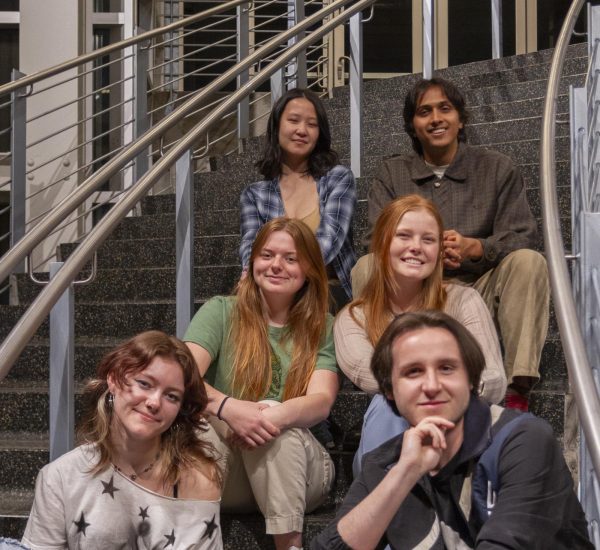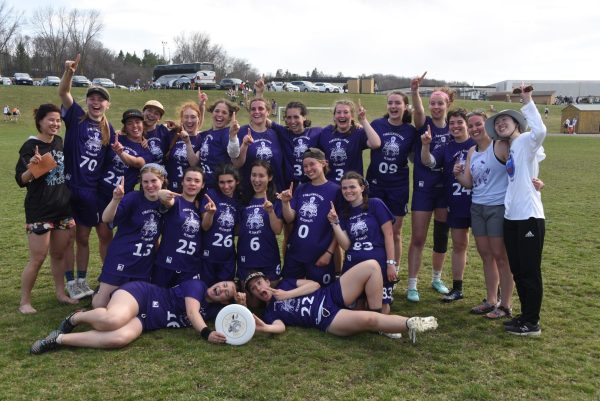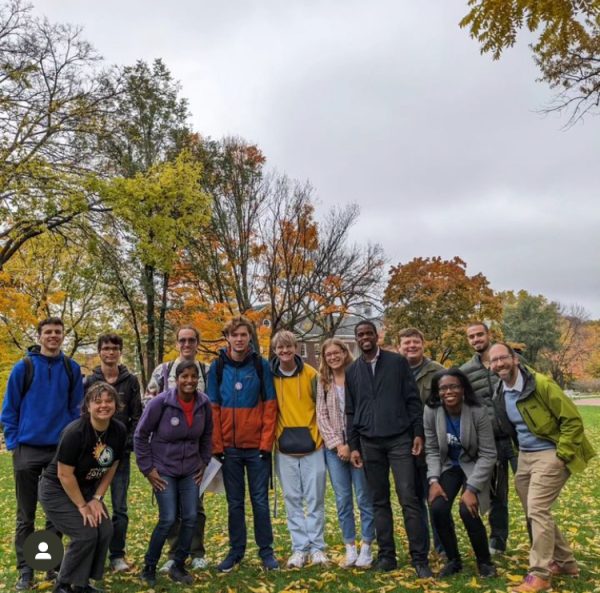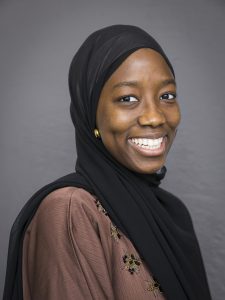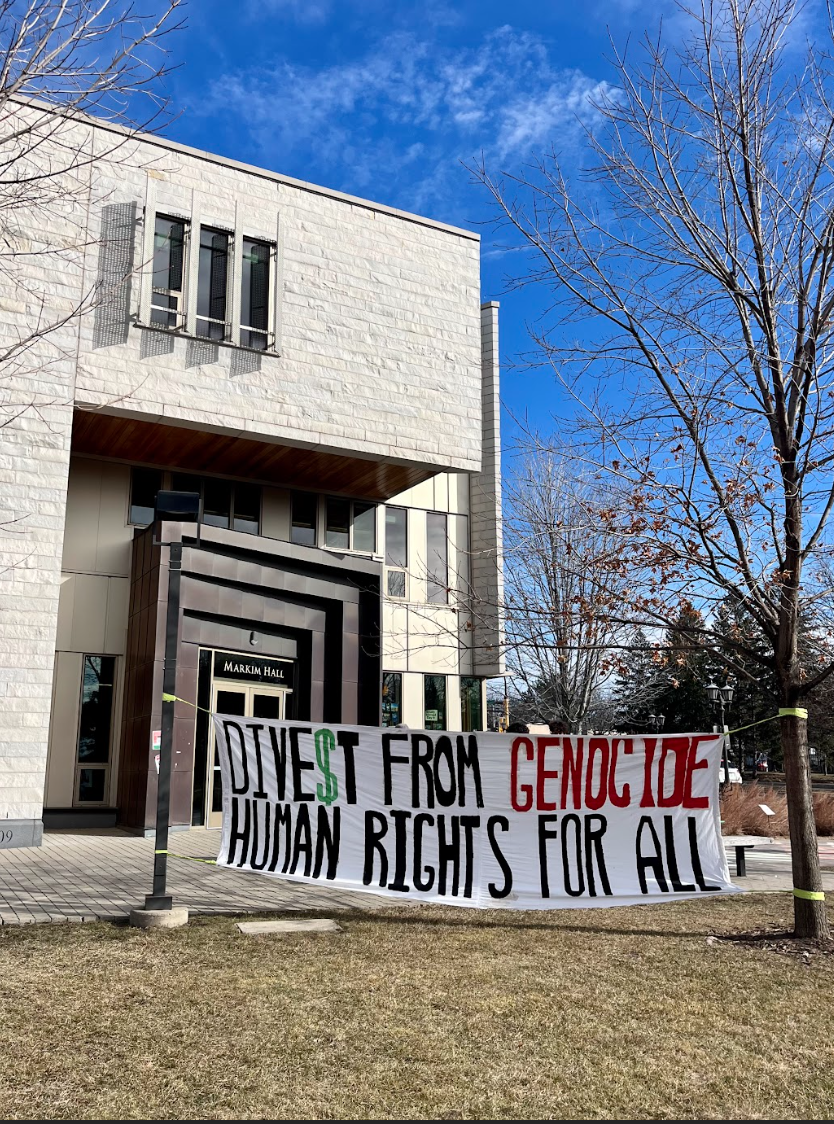
Photo by Henry Nieberg ’19.
“What were you doing when Black Lives Matter was changing the world?”
That’s what Janaya Khan wants students to ask themselves. Khan, also known as “future” within the Black Lives Matter (BLM) movement, spoke for over an hour in Kagin Ballroom on Tuesday, April 5. Khan is a founder of the BLM Toronto chapter and is a queer, gender-nonconforming activist, boxer and social-justice educator, who uses they/their pronouns.
In a conversation moderated by Duchess Harris, chair of American Studies Department at Macalester, Khan discussed wide-ranging topics such as self-care and healing, growing up Black in Canada, and how the BLM movement in Canada differs from that in the US. They were supposed to be joined by Opal Tometi, a co-founder of the BLM movement in the US, but she fell ill at the last minute.
The event was attended by a wide range of members of the Macalester community, including President Brian Rosenberg and local alumni. Members of BLM Minneapolis also attended and spoke with Khan during the question and answer portion of the event.
“I thought it would be interesting,” Danielle Rutledge ’18 said on why she attended the event. “And also, just to be a little bit more informed about things going on.”
Professor Harris started the discussion with a question about Khan’s upbringing in Canada, “What was it like growing up Black in Toronto?”
Khan responded that “it was very consistent with growing up Black anywhere.” They mentioned police brutality, two-tiered education and the development of a school to prison pipeline as hallmarks of global Black experience.
However, Khan also pointed out the uniqueness of the Black experience in Canada — only 2.9 percent of the population identifies as Black, but 10 percent of the prison population is Black. These smaller numbers contribute to “isolation” and an “underdevelopment of a radicalness around Blackness.”
“I knew that Canada was majority [sic] White, but didn’t know the numbers or the history,” Rutledge said.
One point that Khan made about Canada’s Black community is that the “entry points” for activism are different. “There is no such thing as Black nationalism [in Canada], and a lot of the time, that’s what is being fought for here [in the US], some type of nationalism,” Khan said.
Another point is that Black identity differs: “[In Canada], if you ask any Black person who they are, they’re not going to say they’re Black first. They’ll tell you they’re Jamaican; they’ll tell you they’re Haitian.”
Khan also pushed back against the idea that all attention should be focused on the US “Part of the reason why I am here is to disrupt some of those ‘truths,’ because race is not an American issue.”
They discussed how Black activists in Toronto have used solidarity protests against police brutality in the US to publicize similar brutality in Canada.
“People would come out for Rodney King, but wouldn’t come out for Raymond Lawrence [a man killed by the police in the same time period] in Toronto,” they said.
“Many people in Canada actually believe that it is a racial haven,” Khan said, elaborating on why people do not recognize the police brutality in their own country, even if they recognize it in the US.
Harris also asked Khan to speak to their experience with academia and the classroom. Khan stated that though activism can be ruined by academia, educational institutions can help people find activism tools and to deconstruct narratives.
Anna Fineanganofo ’18 expressed surprise that Khan said they were not an activist in college.
“I thought a lot of [BLM organizers] started activism very young.”
The conversation also covered comparisons between the Civil Rights Movement and the BLM movement of today. Khan disputed the idea that the BLM movement is not carrying on the tradition of movements in the past.
“It [the Civil Rights Movement] looked like this: it looked like 15 days out in the cold with no tents and no fire; it looked like 18 days out in the cold, being harassed by helicopters, and police. It wasn’t glamorous,” Khan said.
Khan also spoke about allies and how people can support and be part of the Black Lives Matter movement.
One example that they gave was of Black professors and their allies from institutions in Toronto who supported students involved in protests. Questions that they posed to faculty and staff in general were: “How are you supporting the students? How are you supporting their ability to actually be in movement-building, so that there isn’t an expiration date on it?”
Broadly, Khan emphasized the importance of self-introspection.
“If there’s anyone in this room who ever wondered, what would I have done in that era, during the Civil Rights Movement, during the Black Panther Party, you don’t need to wonder — it’s happening right around you.”
They pointed out, “You will be asked, five years from now, ten years from now, [where were you?] — you should have an answer you’re proud of.”
Overall, both Rutledge and Fineanganofo found the discussion powerful. Rutledge said that she “thought it was powerful in the way that it was more like a call to action, more than just a talk or a dialogue between Duchess [Harris] and the speaker.”
Fineanganofo also found the discussion interesting, having gone to BLM protests: “A lot of the things [Khan was] saying, I’ve heard, going to their [BLM’s] protests. So they really do embody what they were saying.”



